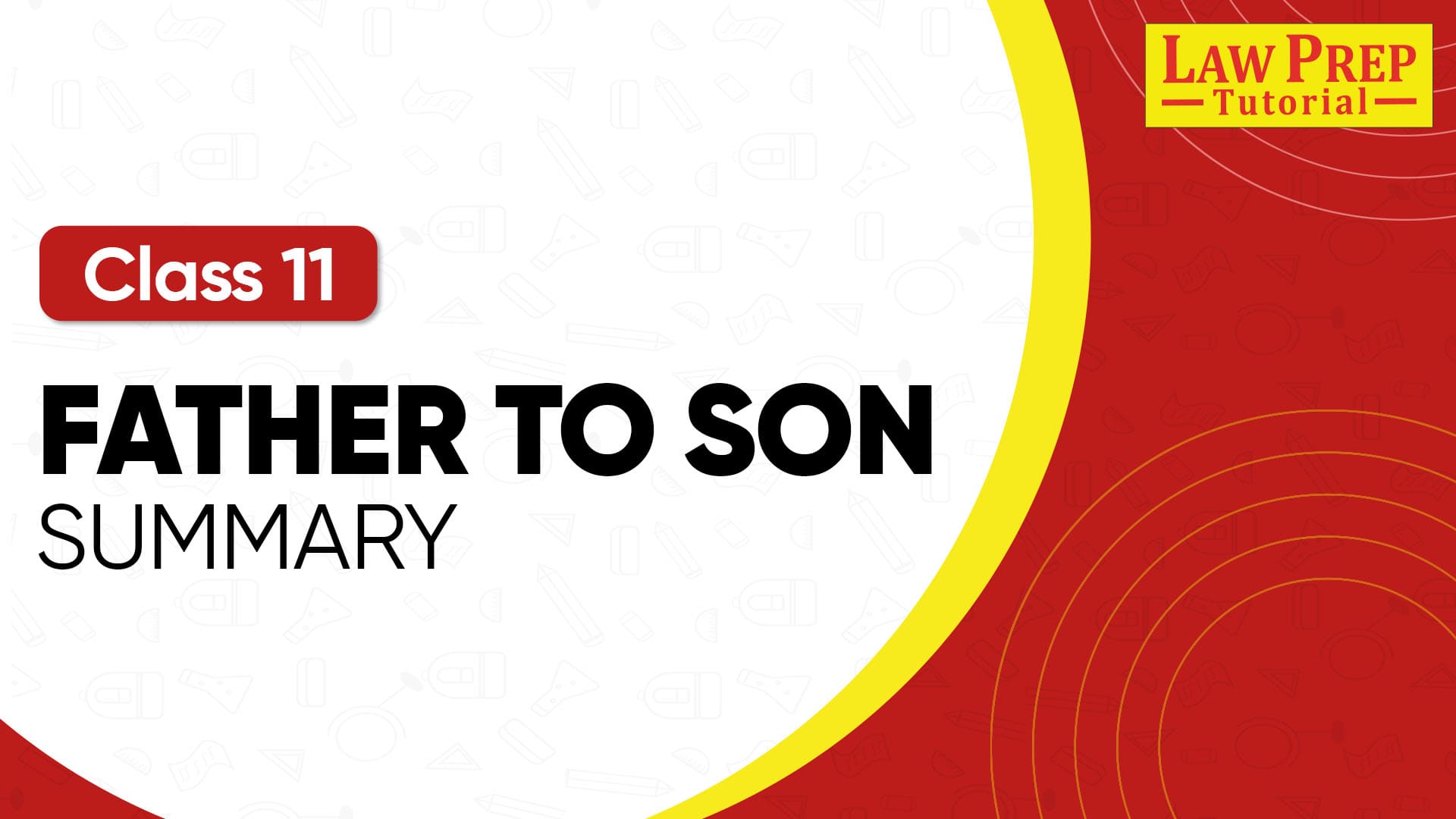When you read the Hornbill poetry section, Father to Son by Elizabeth Jennings is one of the most touching poems. It captures the emotional distance between a father and his son, reflecting the pain of failed communication and the longing for understanding.
Below, we bring you the Father to Son class 11th summary explained in simple words, along with the central idea and theme. The summary and explanation of Father to Son helps you understand how the poem highlights the generation gap and the father’s desire to rebuild the lost bond with his child.
Are you a law aspirant? Book free counselling with India’s best online CLAT coaching.
Father to Son Summary
The poem Father to Son by Elizabeth Jennings explores the strained relationship between a father and his son, focusing on the emotional distance created by lack of communication and understanding. Written in free verse, it captures the father’s deep sense of helplessness as he reflects on how little he knows about his own child.
The father admits that, despite living under the same roof for years, he feels like a stranger to his son. He regrets not having invested enough time and effort in building a closer bond. The son, though his own blood, seems like another person with different ideas, values, and perspectives. This realization fills the father with sadness and guilt, as he feels disconnected from his son’s world.
Throughout the poem, the father expresses his frustration that he cannot share his thoughts freely with his son, nor can the son confide in him. Their conversations lack warmth, and silence has replaced the intimacy that should exist between parent and child. The father realizes that the generation gap is not only about differences in age but also about failure to communicate effectively.
Despite the pain and regret, the father’s tone is not of anger but of longing and love. He still hopes for reconciliation. Toward the end, he acknowledges that both he and his son suffer because of the distance, and both secretly wish to end the conflict. The father desires that they start afresh, letting go of pride and misunderstandings, and rebuild their lost relationship.
The Father to Son poem in class 11 English is not just about one relationship but about a universal experience of many families. It reflects how parents and children often grow apart due to differences in thinking and lack of dialogue, yet deep within, both sides long for love and connection. Elizabeth Jennings highlights the pain of estrangement but also leaves a note of hope—that bonds can be healed with effort, communication, and empathy.
Short Summary of Father to Son Poem
The poem Father to Son by Elizabeth Jennings reflects on the emotional distance between a father and his child. The father feels helpless as he admits that, despite living together, he hardly understands his son. He regrets that they have grown apart and sees his son as a stranger with different thoughts and values. This realization fills him with sadness and guilt.
Their communication is minimal, and silence has taken the place of closeness. The father laments the widening generation gap but does not express anger. Instead, he shows longing for reconciliation and love. Toward the end, he acknowledges that both he and his son suffer from this estrangement and secretly wish to mend their relationship.
The Father to Son poem highlights the universal issue of communication gaps in families and ends with hope that understanding and empathy can bridge the divide between generations.
More Important Resources for CBSE Exam:
| Class 11th Hornbill Syllabus | CBSE Class 11th Commerce Subjects |
| CBSE Full Form | All about CBSE Class 11th |
| Class 11th Syllabus | Class 12th Syllabus |
| Class 11th Commerce Books | CBSE Board: All details |
Father to Son Poem Explanation
Below is the Father to Son line by line explanation:
Stanza 1
I do not understand this child
Though we have lived together now
In the same house for years.
I know nothing of him,
So try to build up a relationship from how
He was when small.
Explanation:
The father admits his helplessness. Even though he and his son have lived under the same roof for years, he feels like he knows very little about him. The father regrets that he cannot understand his son’s thoughts and personality, and now wishes to rebuild the lost bond they once had when the boy was small.
Stanza 2
Yet have I killed
The seed I spent or sown it where
The land is his and none of mine?
We speak like strangers, there’s no sign
Of understanding in the air.
Explanation:
The father compares their relationship to a seed that did not grow as expected. He questions whether he is responsible for their distance or if his son has chosen a separate path. They now speak like strangers, with no warmth or understanding between them, highlighting the emotional gap.
Stanza 3
This child is built to my design
Yet what he loves I cannot share.
Silence surrounds us. I would have him
Prodigal, returning to his father’s house, the home he knew,
Rather than see him make and move
His world.
Explanation:
The father reflects that although his son is his own flesh and blood, their interests and passions differ completely. He cannot relate to his son’s choices. Silence dominates their relationship. The father longs for his son to return to him, like the biblical “prodigal son,” instead of moving away and building a separate world of his own.
Stanza 4
I would forgive him too,
Shaping from sorrow a new love.
Father and son, we both must live
On the same globe and the same land,
He speaks: I cannot understand
Myself, why anger grows from grief.
We each put out an empty hand,
Longing for something to forgive.
Explanation:
In the final stanza, the father expresses his desire to forgive his son and begin a new relationship filled with love. He recognizes that both father and son share the same world and the same sorrow. The son too speaks, confessing that he does not understand himself or why conflict arises. Both realize they long for reconciliation, symbolized by stretching out empty hands, seeking forgiveness and connection.
Central Idea of Father to Son
The central idea of the poem Father to Son is the emotional distance and communication gap between a father and his son. Despite living together for years, the father feels like a stranger to his child and regrets not understanding him. He admits their conversations lack warmth and that silence dominates their relationship.
The father longs for closeness and reconciliation, even using the image of the “prodigal son” to express his hope for the boy’s return. In the end, both father and son realize their sorrow and desire to forgive each other. The poem emphasizes the universal theme of the generation gap and highlights that love and open communication are the only ways to bridge it.
Theme of Father to Son Poem
- Generation Gap: The emotional and mental distance between father and son despite living together.
- Lack of Communication: Silence dominates their relationship, leading to misunderstanding and estrangement.
- Emotional Conflict: The father feels grief and guilt, while the son also experiences anger and sorrow.
- Helplessness in Relationships: Both father and son struggle to express themselves and connect meaningfully.
- Longing for Reconciliation: Despite the distance, both secretly wish to forgive and rebuild their bond.
- Universal Family Experience: The poem reflects a common issue in many families, making it relatable to all generations.
About the Poet of Father to Son: Elizabeth Jennings
Elizabeth Jennings (1926–2001) was a distinguished English poet, often described as one of the most important voices of post-war British poetry. She belonged to the group of poets known as “The Movement,” who focused on clarity, simplicity, and emotional honesty in their works.
Jennings is well known for her lyrical style and for writing about themes such as faith, relationships, love, loss, and human emotions. Her poetry often reflected deep sensitivity and personal struggles, expressed in direct yet powerful language.
In Father to Son, included in the Class 11 NCERT Hornbill textbook, Jennings beautifully explores the universal theme of the generation gap, highlighting the pain of distance in family relationships while leaving readers with a note of hope for reconciliation.
Read the chapter-wise summaries of Class 11 English here:
Poetic Devices in Father to Son
| Poetic Device | Example from the Poem | Explanation |
| Imagery | “Silence surrounds us” | Creates a visual and emotional image of emptiness in their relationship. |
| Metaphor | “Have I killed the seed I spent” | Compares father-son bond to a seed that failed to grow. |
| Alliteration | “Silence surrounds” | Repetition of the ‘s’ sound for emphasis. |
| Symbolism | “Prodigal, returning to his father’s house” | Symbolizes forgiveness and reconciliation, taken from the biblical story of the Prodigal Son. |
| Repetition | “I do not understand” | Highlights the father’s helplessness and emotional distance. |
| Contrast | “Father and son, we both must live / On the same globe” | Shows closeness in space but distance in emotions. |
| Free Verse | Whole poem | No rhyme scheme or fixed structure, reflecting natural thought flow. |
Word Meanings in Father to Son Class 11 Poem
| Word | Meaning |
| Prodigal | Reference to the biblical story of a son who returns home after wasting his inheritance, symbolizing repentance and reconciliation. |
| Sown | Planted (used metaphorically for nurturing a relationship). |
| Strangers | People who are unfamiliar to each other. |
| Forgive | To pardon or let go of past mistakes. |
| Sorrow | Deep sadness or grief. |
| Empty hand | Symbol of longing for connection and reconciliation. |
| Anger grows from grief | Expression of conflict that arises out of sadness and misunderstanding. |
| Design | Refers to father’s role in shaping the son’s life. |
| Silence surrounds | Lack of communication dominating the relationship. |
| World | Son’s independent life, separate from the father’s. |
Find detailed questions and answers from all chapters of English Class 11 now:
FAQs About Father to Son Summary
Father to Son is written by Elizabeth Jennings, a renowned English poet known for her simple, emotional, and reflective style.
The poem highlights the emotional gap between a father and his son, caused by lack of communication and understanding, and ends with a hope for reconciliation.
The father feels helpless, guilty, and saddened by the emotional distance from his son. He longs to rebuild their lost bond.
The “prodigal son” symbolizes reconciliation. The father hopes his son will return to him with love and closeness, just as in the biblical story.
It is described as distant and strained. Despite living together, they speak like strangers and fail to understand each other.
“Empty hand” symbolizes longing, helplessness, and the father and son’s mutual desire for forgiveness and connection.
The poem ends with both father and son realizing their sorrow and stretching out empty hands, longing for reconciliation and forgiveness.
It helps students understand family relationships, the generation gap, and the importance of communication, while also preparing them for exams with its relatable themes and simple language.
Check the latest CBSE Class 11 syllabus for all subjects below:
Explore the updated CBSE Class 12 syllabus for all subjects here:
Discover CLAT exam resources that can help you get started early:
Explore CLAT coaching centers across different cities:


